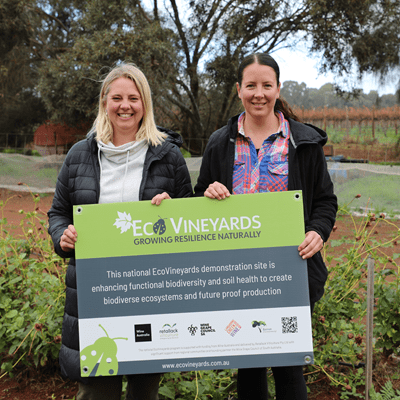Tell us in a few sentences about your experience as a viticulturist, how did you arrive here?
The vineyard has been in our family for over 110 years, and we are the 4th generation that has farmed our land. In addition to growing grapes, the property has previously had sheep, cattle, dairy, grain and more recently cut flowers. Irrigation has been carried out on the property for over 70 years, but we are lucky enough to be on the Bremer River flood plain that sees annual flood irrigation.
Why did you decide to apply to be an EcoGrower, was there something specific that influenced your decision and/or had you attended a previous EcoVineyards session?
We had heard a lot of positive feedback and thought it could be beneficial for both the vines and our cut flowers. The vineyard has a long history of being heavily involved in conservation, so this felt like a good fit for us. Since starting our cut flowers, we have had a thrip outbreak that did quite a lot of damage. Finding an eco-friendly way to help prevent and manage this in the future was very appealing, along with the possibility of using these plants within our business.
Has there been a defining moment or catalyst for you to move towards more ecologically driven viticultural practices?
Many years ago, our dad, Dennis, started a Landcare group and began planting trees around various parts of the district. Since then, we have always had an interest in conservation and ecological viticulture practises are just an extension of this. We have been involved in many projects over the years, locally, and on our own property. For example, the Angas Bremer Irrigation Revegetation Project and planting extensive belts of native flora throughout the property.
Can you provide a brief overview of your project ideas, and what you wish to achieve over the 3 years and why is this important to you?
-
- Hoping to increase the number of predatory insects around the property, to help suppress other insects that can be detrimental to both our flower and vineyard crop.
- Use native vegetation to out compete weeds.
- Two-fold benefit of being able to use these native species in our cut flower business.
- Leaving behind a smaller environmental footprint for future generations.
- Reduce costs on things such as fuel and chemical by using more ecologically sound practices.
Where do you see grape growing in the future, do you feel there is an urgency to change current practices? If so, why?
Improving biodiversity and sustainable farming practices is the way of the future. There is now a bigger body of evidence and research supporting this which can only benefit both farmers and the environment. Climate change has had a big impact on our vintages, and we need to be able to adapt to this for the future of grape growers.

